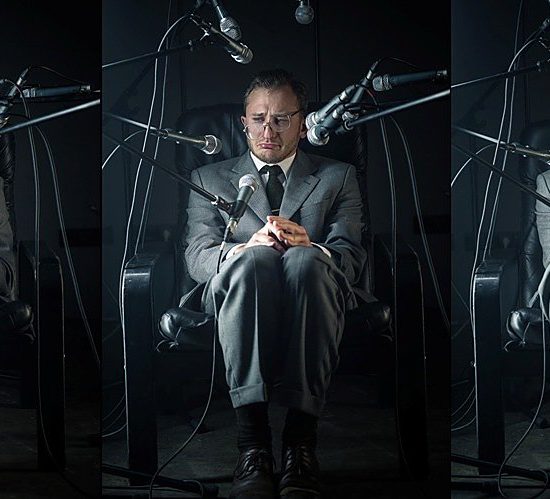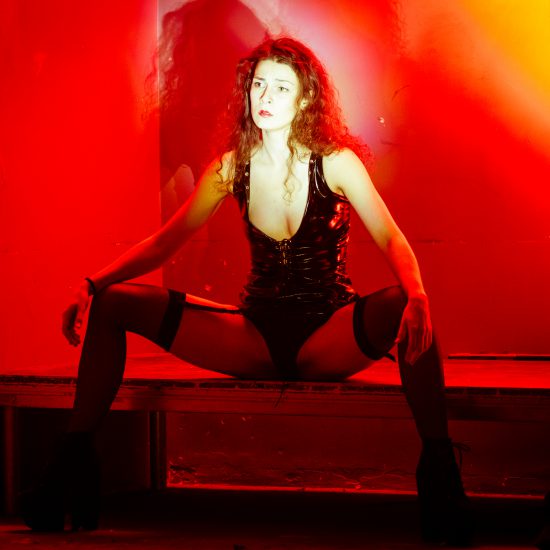Repetitions of Oedipus the King (3)
Oskaras Korsunovas’ theatre is covered by creative fury which is going further. Rehearsals of Oedipus the King gets fiercier and fiercier. Outlines of the performance gets clearer. Strain is increasing. Here we’d like to discuss the experience of Antique which is accumulated by creators, the clash with vitality and horror, the sagacities and states that accompanies the process of performance’s staging.
Life, Horror and Unexpectedness
The concord and harmony of Antique sometimes is shaken by the blast of the madness and insanity. Although last month in Lithuanian cultural press (see: D.Dilyte, “Nepabaigiama Antikos sklaida”, Naujasis zidinys, 2002, No. 4) the urgency of Antique was discussed with emphasis on its’ harmonious origin, still Nietzche’s and Colli’s sagacities about facadeless spontaneity of Greek culture stirs deep in the heart. The savageness of Apollo’s, the perfect arts’ guardian, is testified by the tears of Niobe and the lament of Marsius’ skin, which is blowing in the wind. Myth is the most primordial source that witnesses the horrific experiences of Greek world. Story of Oedipus is horrifying and disturbing. However, the culture is merciless for everything that is chthonic and inscrutable. It knows how to classify and name everything. It knows how and what should have a place. It skillfully subjugates. It subjugates and arranges everything in such way, that time is coercing mad and at the same time vital origins to become stiff in marble statues, bas-relieves of the temples, allegorical plots, neutral poetry, formation of the terms and speculations of the philosophers. While we are trying to reach the myth, we may found ourselfs on a crossroad. We may clearly recognise the plot, which is given to us, we may accept its’ cultural charge and its’ symbolical meaning, but still we must solve the question about life of the myth. We must find the key to mythological reality. Actually, myth always inclines to become just a story, paradigm of human thought, complex of subconsciousness, phenomenon of culture, plot of the play or axis of the work of art. All of that is important, authoritative and indubitable. However, the question about life is much more sharp and risky. Life of the myth lays on relation between the myth and the person coming towards it. Such relation might be provided by theatre. The live theatre of relation provides one of the ways, which can lead myth to break through our personal and very often closed dimenssion of experience. Experience of life assures the grant of certitude. Life that may be discovered in reality, life that disturbes us by its inconstancy, life that makes us move and act. It stimulates our activity and continual production. Tragic experience of life and its’ creep into consciousness has reduced Greeks into civilisation of mad cultural producers. Going through their own certitude and – at the same time – tragic spirtit of reality by itself, they continually were seeking for the new evidences of these experiences.
Certitude and life are such kind of things that rather intoxicates. In order to understand this we should realise the principle by itself, the principle which reveals vital capacity for the life and trouthfulness for the reality. Lithuanian thinker, who’s question of the reality’s troughfulness seamed to be the most radical in recent years, once said such scientificless words in a scientific conference: “Unexpectedness that strikes us from the very first moment of our life until the last one, rather scares and tortures than couses joy or, at least, consoles. It brings disorder, desire and the death to the world. It condemnes us to “nomadic” existence. Evidently, relentless desire for order and settled life, the wish to trust that we still may overcome the unexpectedness, makes us to undertake the ruse that we might name the philosophy” (T. Sodeika, “Apie tai, kaip Aristotelis vijo netiketuma į Porfyrijaus medi, kaip Deleuze’as ir Guattari bande tam pasiprie�inti ir apie Nietzsches juoka pro asaras”, Tapatybės sklaida ir ribos. Mokslinės konferencijos med˛iaga, Vilnius, 2001, P. 38.). However, there are some more of ruses those might overcome the unexpectedness. Sophocles was behaving cunningly as well. The dizziness of unexpectedness persecuted him by the whole horror of the Oedipus’ myth. His ruse – ambiguous and full of oposite meanings “Oedipus the King”.
However, what are we talking about? Where is hidden the horror that is brought for us by the unexpectedness of Oedipus’ story? What kind of fear do we keep in mind? At the first glimpse, the myth itself without hesitation strikes an answer to us. That answer could have been repeated even by enough educated secondary-school boy. Obviously, the point here is in fate – cruel, wry-tongue god of Delphi, Lycean Apollo, Loxeus that hides the road by covered hints, the same one that is named lucifer Foibes – and the fate is horrific. It condemnes us to the “nomadic” existence. It strikes us. If we chalenge it to a duel, we’ll be doomed to defeat. The more guts we have the more subtle we are being derided. Unexpectedness – the principle of its’ act. It brings death, desires and the celebrated peripeteias. That cruel and fatalistic moment seems to be placed into other area for the mentality of person of the modern time. Destiny and the myth that proclaims it, gets the name of subconsciousness. The science, which before that was willing to see only harmonious and eurythmic side of the world, henceforth begins to speak in its’ terms about mysteries of the soul and the chthonicness. Unexpectedness gets a place here. Destiny and subconsciousness – these are the two names for the same nomadic nature of the world.
However, the horror and the fear are penetrated into the story of Oedipus even deeper. Gift of Sophocles is evidentely reveald by the mouth of Teyresias. “Alas! Alas! It’s horrible to know! There is no benefit of knowing”, – says suddenly appeared person who knows all the truth. He tells us about horrible knowing, about the desire to know, which reveals itself by the deformed relations. Namely, the desire which pushes Oedipus to reach the knowledge. Heidegger, – who felt that the power of the poetry of “Oedipus the King” is drawing nearer to the death, – regrets for our state as the culture’s inheritors: “Our present mood – which is the mood of contemporary people – for all that is named as existence, truth and semblance since the ancient times has became so comlicated, has lost its ground and desire in so irreversible way that we, even if we interpete or realise the Greek poetry, still get only small portion of the poetical pronuntiation’s power which we might get from the Greek own hier Sein” (M. Heidegger, Einfürung in die Metaphysik, Tübingen: Niemeyer, 1958, S. 115). Heidegger criticizes the modern, neutral, information accumulated and patronized by the science knowledge and talks about the desire, which is pierced through Greek consciousness. Why is that so horrible to know? Dear reader, do you know someting that would raise the horror for you? The knowledge, which multiplies the units of information is essentialy different from the knowledge that shudders Oedipus. The real horror may be raised only from the very deepest backstairs of human soul. That kind of question arises then we clash with ourselves, then we stand up in the presence of that what is often named as identity. Thus the motif that appears in the begining of “Oedipus the King” – who is the killer – identifies with the efforts for elucidation – what is the human being, or if we expresed ourselves more precisely, – who am I. Heidegger mentions the human inclination for the repose in the world of semblance many times. It is the great chalange to look at yourself. That is the task, which we try to substitute. Undressing in your own presence is even more complicated then in somebody’s else. That is radical step, which provides knowledge with another quality. That is not a knowledge, which might be found on the internet, in books, on TV broadcasts or in the supermarkets, it’s rahter the knowledge that was descripted upon the temple of Apollo in Delphi – gnoothi seauton – “make acquaintance with yourself”. Depth of the same knowledge is revealed by wise confession of Socrates “I know that I know nothing”. What strikes us is the revelation of the submerged identity’s parts and the nightmare of darkest nights.
However, horror and irony is separated only by small step in the art. Namely, this perspective have been perfectly realised by Mauro Biancanotte who was recently introduced to our readers. Namely, his attention to horror, unexpectedness and irony echos in the backstairs of the staging performance’s rehearsals. Few weeks ago we might read in the pages of “Siaures Atenai”: “Art is very similar to the reality. Actually, art is reality. When it is governed by unexpectedness. Formerly Greeks admired the realistic harmony. That harmony was unexpectedness. Polignothes – we should believe – has painted the stoya of Athens in unexpectedly realistic way. Like unexpected is the psychodelic music of Cage. Like unexpected is the poetry of Leopardi. Like unexpected is the downpour in a sunny summer day. Or like unexpected death of my uncle due to overeating of cakes, which were made by woman who lived in his neighbourhood. Aristoteles was boring guy, still he foreboded the greatness of the unexpectedness and named it the peripheteia. For the juice of wisdom comes from unexpectedness. Trembling of reality breaks through unexpectedness”. Those words reminds us the delirium, still they reveal the strange course of thinking – the events of art and life, those which have nothing to do with each other at the first glimpse, are put into one line according to the principle of unexpectedness. In this case, it is not important what is the discussion about – the unexpected turns of the plot or unexpected strategy of its puting into shape, i.e. is it about the forms of expression or about unexpected experience of the “nomadic” egzistence by itself. In Sophocles’ work this perspective is revealed by the drama’s composition, i.e. its’ detective exposition. The intrigue of the latter detectives also has the same basis of construction. Maybe that is the aim for contemporary postmodernist Umberto Eco’s consideration that detective is the most methaphisical type of novel. Here we try to empasize what is the matter that gives vital urgency to the art. Art doesn’t comes closer to the life when it becomes realistic. It comes closer when it starts to pulse simultaneously with the life. Facade of life isn’t the clue for wonder. The clue is hidden in the mastering of the life ontology’s mechanism.
Nonsence and Schysophrenia
Nonsence is the great thing when your are able to listen it attentivelly. On Lithuanian mistaken paths of internet sites your may discover that kind of Oedipus story’s interpretation: “According to Greek oracle, Oedipus, the son of the Thebes’ king Layas and queen Iocaste, was doomed to kill his own father and merry his own mother. That predication fulfilled. Oedipus was protecting the town from the monster and killed an oldman that – as occured later – was his father Laius. As a liberator he got married to queen Iocaste. They’ve got two sons and two daughters. However, the land was flooded by disasters. Oracle said to Oedipus that it was a revenge of gods for the patricide and incest. Complex of Oedipus is a mental disease when a boy is morbidly attached to his mother and feels sexual attraction to her. He feels jealousy to his father as well. That is the only one disease closely related with mythology.
The opposition to that disease is comlex of Electra – morbid daughter’s attraction to her father. Mystical Electra also loved her father and hated her mother who had killed him”. We are not going here to criticise the authors of this quotation., mock at their lack of education, their rude exposition of words and thoughts. We’d like to extend this paradoxical and mad thought, to transmite it into the world of dreams and creative visions, where is still left some space for Nietzsche’s ironical quotations and for some of Deleuze’s and Guattari’s laws of shysoanalysis. Right away we warn that in further part of the text the lack of logic is conscious, the inexact and tangled quotations of Sophocles play are used also consciously. And somewhy here is spoken by the first person.
Dream
Complex of Oedipus is terrible disease. Disgusting and hard. Exactly the same as the fate and inclement weather. In front of me mythology morbidly grimases. Here shoud be smell of the oils. The body is poured on by oil. Little red spade. By night winged tom-cats rape their victims and later the snakes knock my windows with their tails. I wouldn’t answer if you were asking. Organ and little pipe of Marsius starts to play. Crazy tympana. Rattlesnakes. Bassoon. Somebody should live in the sand. Thousands of little mouses dance the ecstatic fate-dances. While Nietzsche sits down on the swing and strokes my hairs. “Hey boy, what are you doing? Are you escaping the fate? Don’t even try to solve a riddle” “You scoff from that is my dignitary! Don’t I come up with in the gods! I am the best in solving riddles!” “We long for what is true – he siches – but wouldn’t be nicer to wish for the untruth, uncertainesss and even for the ignorance? Is the problem of truth came up to us? Or do we came up to that propblem? Who’s Oidipus in our midst? Who’s the sphinx? Here is the rendezvous – the questions and the questionmarks has an appointment! Yeah, that hapens – after all we’ll start to think that promblem has never been raised before. As if we were the first ones who saw it, the first ones who payed attenttion to it and the first ones who made up our minds. There’s not a little risk here. Maybe there isn’t the problem that would be greater.” Ahoy! Friedrich, don’t you speak about gods!
Through the door breaks in raped Chrisipus with the corps of Layas in his hands. He yells and looks for the rope.
The tragedy resembles to the substation of electricity. You may feel the quiet vibration of voltage after opening of the door. Eh, what a mad desire might push you to grab the overt wires…
If spectator doesn’t feel mistaken and disbalanced, if he doesn’t feel the nightmare and he still keeps his comfortable world, if he doesn’t clash with unlogical and shysophrenic reality, he won’t be able to grasp the mythological drama. Each personal and cultural experience has to be struck by the grimaces and changes, motion and masks, strechings and disharmony. Obviously plot gives you the unrhetorical and unpolemical question. That’s the riddle and its solvation, as we know, gives either life or death. The establishment of the rules to myth means to break every possible rules at the same time. Pharanormalness of a myth is the only one adequate relation with the strange mythologic reality. Myth is stiff in the statues, petrified, painted in banal colours of Renaissance’s pictures.
Tragedy splits according to the principle of shysoanalisis. It disperses in endless pairs of dualism, branches out like the unsymmetric and vital plant. The inner dualism of drama isn’t bipolar. Tragedy is paradoxical. Its’ compossition is perfectly symmetrical and its’ inner kinetics of the subject and chorus’ parts shoots up with the measureless and primordial fluctuations. Those fluctations doesn’t draw the diagram of the symmetric amplitude. Those fluctations encounters in certain points like the curve would collide with the straight. Those fluctations raises the changes in the time perception and logical structures.
Myth as a nightmare
Myth as a story. Myth as an explanation. Myth as religion. Myth as a plot. Myth as a literature. Myth as an aesthetics. Myth as a common trait. Myth as an abstraction. Myth as a way of thinking. Myth as a structure. Myth as subconsciousness. Myth as a pretext. Myth as a culture. Myth as a change. Myth as a symbol. Myth as a world. Myth as an unlogic. Myth as a logic. Myth as a nightmare.
Translation by Gediminas Pulokas



